2019 Ukrainian parliamentary election
Snap elections to the Ukrainian parliament were held on 21 July 2019.[1] Originally scheduled to be held at the end of October, these elections were brought forward after newly inaugurated President Volodymyr Zelensky dissolved parliament on 21 May 2019, during his inauguration.[2] The election result was the one-party majority, a novelty in Ukraine, for President Zelensky's Servant of the People party with 254 seats.[3]
| |||||||||||||||||||||||||||||||||||||||||||||||||||||||||||||||||||||||||||
424 (of the 450) seats to the Verkhovna Rada of Ukraine 226[lower-alpha 1] seats needed for a majority | |||||||||||||||||||||||||||||||||||||||||||||||||||||||||||||||||||||||||||
|---|---|---|---|---|---|---|---|---|---|---|---|---|---|---|---|---|---|---|---|---|---|---|---|---|---|---|---|---|---|---|---|---|---|---|---|---|---|---|---|---|---|---|---|---|---|---|---|---|---|---|---|---|---|---|---|---|---|---|---|---|---|---|---|---|---|---|---|---|---|---|---|---|---|---|---|
| Opinion polls | |||||||||||||||||||||||||||||||||||||||||||||||||||||||||||||||||||||||||||
| Turnout | 49.84% | ||||||||||||||||||||||||||||||||||||||||||||||||||||||||||||||||||||||||||
| |||||||||||||||||||||||||||||||||||||||||||||||||||||||||||||||||||||||||||
| |||||||||||||||||||||||||||||||||||||||||||||||||||||||||||||||||||||||||||
About 80 percent of the elected candidates were new to parliament; 83 deputies managed to get reelected from the previous parliament and 13 deputies from earlier convocations.[3] All deputies from Servant of the People were political newcomers.[3] 61 percent of the new MPs had never before been engaged in politics.[3]
Out of 225 constituencies, 26 were suspended due to the March 2014 annexation of Crimea by Russia and the ongoing occupation of parts of Donetsk Oblast and Luhansk Oblast by separatist forces of the self-declared Donetsk People's Republic and Luhansk People's Republic (since April 2014).
Background
Originally scheduled to be held at the end of October 2019, the 2019 Ukrainian parliamentary elections were brought forward after newly inaugurated President Volodymyr Zelensky dissolved parliament early on 21 May 2019 (a day after his inauguration), despite claims that he did not have the legal grounds to do this. After Zelensky issued the decree (calling early elections), a lawsuit was filed to the Constitutional Court of Ukraine, which sought to declare the decree unconstitutional and therefore illegal.[4][5] The court declared the decree to be legal on 20 June 2019.[2][6] The official reason why Zelensky dissolved parliament was "a lack of a government coalition".[7]
Following the 2014 parliamentary elections, the Petro Poroshenko Bloc (PPB) party became the largest party, after securing 132 seats. On 21 November 2014, the Petro Poroshenko Bloc, People's Front, Self Reliance, Fatherland and the Radical Party all signed a coalition agreement.[8] Arseniy Yatsenyuk became Prime Minister on 2 December 2014. The Radical Party left the coalition on 1 September 2015 in protest over a vote in parliament involving a change to the Ukrainian Constitution that would lead to decentralization and greater powers for areas held by separatists.[9] February 2016 saw the start of the fall of the Yatsenyuk cabinet after the economy minister Aivaras Abromavičius announced his resignation claiming the government did not have real commitment to fight corruption.[10] On 17 and 18 February 2016, the Fatherland and Self Reliance parties left the coalition; meaning that the coalition became 5 deputies short of the 226 needed.[11] On 14 April 2016, Volodymyr Groysman became the new Prime Minister and the Groysman government began with a new cabinet of ministers.[12] Due to the short period of time available to organize the 2019 parliamentary election, current Ukrainian public procurement laws were not followed and to bypass this, local election commissions will work under deferred payment.[4]
Electoral system
Under current law 225 members of the Verkhovna Rada are elected by nationwide closed party-list proportional representation with 5% electoral election threshold and the other 225 seats elected in constituencies with a first-past-the-post electoral system in one round (candidate with the highest vote total wins).[13][14][15][16] 21 parties take part in the election in the nationwide party-list.[17] For the elections there was established a state financing for all political parties that received 2% support, but on 2 October 2019 that law was canceled.[18]
Out of 225 constituencies, 26 are suspended due to the March 2014 annexation of Crimea by Russia and the occupation of parts of Donetsk Oblast and Luhansk Oblast by separatists (since April 2014).
Candidates had until 20 June to submit documents to the Central Election Commission of Ukraine to register as candidates for the position of deputy of the Verkhovna Rada.[19] On 25 June 2019, the Central Election Commission ended its registration process.[17] It registered 5,845 candidates for the elections:[17] 3,171 candidates in the single-member constituencies and 2,674 candidates in the single nationwide constituency with 22 parties.[17][20]
Since 2014, various politicians have proposed to reform the electoral system to 100% party-list proportional representation with open lists.[13] President Zelensky is the main proponent.[21] The proposal is opposed by Yulia Tymoshenko.[22] A vote on the proposal (authored by the president) was supposed to take place on 22 May 2019, but members of parliament voted against including it in the agenda.[21][23]
Contesting parties
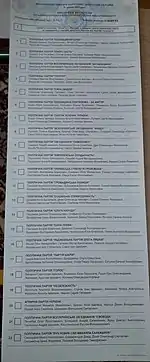
List of registered parties[24][25]
- Opposition Bloc (Evgeny Muraev)
- Strength and Honor (Ihor Smeshko)
- Fatherland (Yulia Tymoshenko)
- Patriot (Mykola Holomsha)
- Force of People (Oleksandr Solotai)
- Opposition Platform — For Life (Yuriy Boyko / Vadim Rabinovich)
- Party of Greens of Ukraine (Tetyana Bodun)
- Torch (Tetyana Odnoroh)
- Self Reliance (Andriy Sadovyi)
- European Solidarity (Petro Poroshenko)
- Ukrainian Strategy of Groysman (Volodymyr Groysman)
- Civil Position (Anatoliy Hrytsenko)
- Social Justice (Alla Shlapak)
- Servant of the People (Dmytro Razumkov)
- Power of the Law (formerly Hope) (Andriy Senchenko)
- Radical Party of Oleh Lyashko (Oleh Lyashko)
- Party of Shariy (Olha Shariy)
- Voice (Svyatoslav Vakarchuk)
- Independence (Anatolii Mohyliov)
- Agrarian Party of Ukraine (Mykhailo Poplavskyi)
- Freedom (Oleh Tyahnybok)
- Movement of New Forces (Mikheil Saakashvili)
Opinion polls

Results
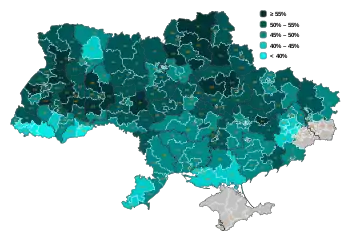
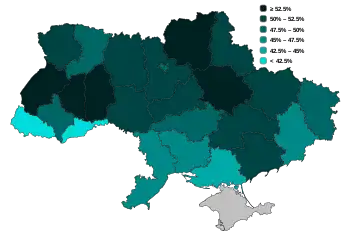
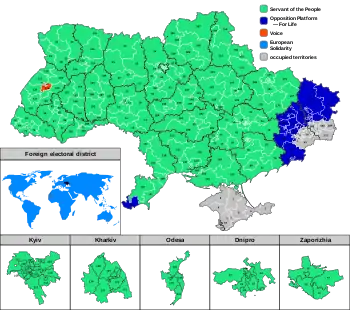
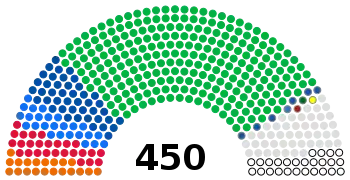 | ||||||||||
|---|---|---|---|---|---|---|---|---|---|---|
| Party | PLPR | FPTP | Total | +/– | ||||||
| Votes | % | ±pp | Seats | Votes | % | Seats | ||||
| Servant of the People | 6,307,793 | 43.16 | New | 124 | 130 | 254 | New | |||
| Opposition Platform — For Life | 1,908,111 | 13.05 | New | 37 | 6 | 43 | New | |||
| Fatherland[lower-alpha 2] | 1,196,303 | 8.18 | 24 | 2 | 26 | |||||
| European Solidarity | 1,184,620 | 8.10 | 23 | 2 | 25 | |||||
| Voice | 851,772 | 5.82 | New | 17 | 3 | 20 | New | |||
| Radical Party of Oleh Lyashko | 586,384 | 4.01 | 0 | 0 | 0 | |||||
| Strength and Honor | 558,652 | 3.82 | 0 | 0 | 0 | |||||
| Opposition Bloc | 443,195 | 3.03 | New | 0 | 6 | 6 | New[lower-alpha 3] | |||
| Ukrainian Strategy of Groysman | 352,934 | 2.41 | New | 0 | 0 | 0 | New | |||
| Party of Shariy | 327,152 | 2.23 | New | 0 | 0 | 0 | New | |||
| Svoboda[lower-alpha 4] | 315,568 | 2.15 | 0 | 1 | 1 | |||||
| Civil Position | 153,225 | 1.04 | 0 | 0 | 0 | |||||
| Party of Greens of Ukraine | 96,659 | 0.66 | 0 | 0 | 0 | |||||
| Self Reliance | 91,596 | 0.62 | 0 | 1 | 1 | |||||
| Agrarian Party | 75,509 | 0.51 | — [lower-alpha 5] | 0 | 0 | 0 | — [lower-alpha 6] | |||
| Movement of New Forces | 67,740 | 0.46 | New | 0 | 0 | 0 | New | |||
| Force of People | 27,984 | 0.19 | 0 | 0 | 0 | |||||
| Power of Law | 20,340 | 0.14 | New | 0 | 0 | 0 | New | |||
| Patriot | 16,123 | 0.11 | New | 0 | 0 | 0 | New | |||
| Social Justice | 15,967 | 0.11 | New | 0 | 0 | 0 | New | |||
| Independence | 7,970 | 0.05 | New | 0 | 0 | 0 | New | |||
| Torch | 7,739 | 0.05 | New | 0 | 0 | 0 | New | |||
| United Centre | 0 | 1 | 1 | |||||||
| Bila Tserkva Together | 0 | 1 | 1 | |||||||
| Independents | 0 | 46 | 46[lower-alpha 7] | |||||||
| Total valid votes | 100 | 225 | 100 | 199 | 424 | |||||
| Invalid ballot papers | ||||||||||
| Vacant (constituencies with no voting) | 26 | 26 | ||||||||
| Total | 225 | 225 | 450 | |||||||
| Registered voters/turnout | 35,550,428 | |||||||||
| Source: CEC (Proportional votes, Single-member constituencies) Ukrainian Pravda (Seats and regions) | ||||||||||
Electoral support for the parties
- Servant of the People
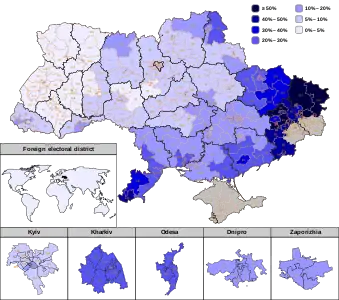 Opposition Platform — For Life
Opposition Platform — For Life- Fatherland
- European Solidarity
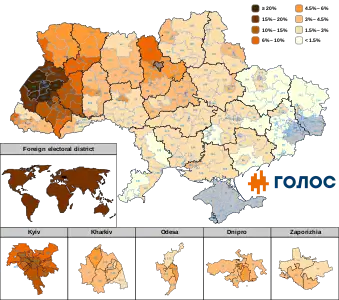 Voice
Voice
Single-mandate constituency results
| Winners in single-member constituencies | ||||||||
|---|---|---|---|---|---|---|---|---|
| Region | District[District][28] | Candidate[29] | Votes %[29] | Party member[29] | ||||
| № | Name | № of mandates | Geographical reference and name | № | ||||
| 1 | AR Crimea | 10 | South-East Simferopol-Tsentralny | 001 | — | — | — | |
| 1 | AR Crimea | 10 | South-East Simferopol-Kyivsky | 002 | — | — | — | |
| 1 | AR Crimea | 10 | South-East Dzhankoy | 003 | — | — | — | |
| 1 | AR Crimea | 10 | South-East Yevpatoriya | 004 | — | — | — | |
| 1 | AR Crimea | 10 | South-East Kerch | 005 | — | — | — | |
| 1 | AR Crimea | 10 | South-East Feodosiya | 006 | — | — | — | |
| 1 | AR Crimea | 10 | South-East Yalta | 007 | — | — | — | |
| 1 | AR Crimea | 10 | South-East Sudak | 008 | — | — | — | |
| 1 | AR Crimea | 10 | South-East Krasnoperekopsk | 009 | — | — | — | |
| 1 | AR Crimea | 10 | South-East Bakhchysarai | 010 | — | — | — | |
| 2 | Vinnytsia | 8 | Central Vinnytsia (Vyshenka) | 011 | Maksym Pashkovskyi[30] | Servant of the People | ||
| 2 | Vinnytsia | 8 | Central Vinnytsia (Zamosttia) | 012 | Anatoliy Drabovskyi[30] | Servant of the People | ||
| 2 | Vinnytsia | 8 | Central Kalynivka | 013 | Petro Yurchyshyn[31] | Independent | ||
| 2 | Vinnytsia | 8 | Central Zhmerynka | 014 | Iryna Borzova[30] | Servant of the People | ||
| 2 | Vinnytsia | 8 | Central Shargorod | 015 | Larysa Bilozir[30] | Independent | ||
| 2 | Vinnytsia | 8 | Central Yampil | 016 | Hennadiy Vatsak[30] | Independent | ||
| 2 | Vinnytsia | 8 | Central Ladyzhyn | 017 | Mykola Kucher[30] | Independent | ||
| 2 | Vinnytsia | 8 | Central Illintsi | 018 | Oleh Meidych[30] | Fatherland | ||
| 3 | Volyn | 5 | West Volodymyr-Volynsky | 019 | Ihor Huz[30] | Independent | ||
| 3 | Volyn | 5 | West Horokhiv | 020 | Vyacheslav Rublyov[30] | Servant of the People | ||
| 3 | Volyn | 5 | West Kovel | 021 | Stepan Ivakhiv[30] | Independent | ||
| 3 | Volyn | 5 | West Lutsk | 022 | Ihor Palytsia[30] | Independent | ||
| 3 | Volyn | 5 | West Manevychy | 023 | Iryna Kostankevych[30] | Independent | ||
| 4 | Dnipropetrovsk | 17 | South-East Dnipro-Industrialnyi | 024 | Dmytro Kysylevskyi[30] | Servant of the People | ||
| 4 | Dnipropetrovsk | 17 | South-East Dnipro-Chechelivsk | 025 | Maksym Buzhanskyi[30] | Servant of the People | ||
| 4 | Dnipropetrovsk | 17 | South-East Dnipro-Shevchenkivskyi | 026 | Kyrylo Nesterenko[30] | Servant of the People | ||
| 4 | Dnipropetrovsk | 17 | South-East Dnipro-Sobornyi | 027 | Vyacheslav Medyanyk[30] | Servant of the People | ||
| 4 | Dnipropetrovsk | 17 | South-East Dnipro-Novokodatskyi | 028 | Yuriy Mysyahin[30] | Servant of the People | ||
| 4 | Dnipropetrovsk | 17 | South-East Dnipro (Yuvileine) | 029 | Serhiy Demchenko[30] | Servant of the People | ||
| 4 | Dnipropetrovsk | 17 | South-East Kamianske | 030 | Hanna Lichman[30] | Servant of the People | ||
| 4 | Dnipropetrovsk | 17 | South-East Kryvy Rih-Ternivsky | 031 | Volodymyr Zakharchenko[30] | Servant of the People | ||
| 4 | Dnipropetrovsk | 17 | South-East Kryvy Rih-Dovhynetsky | 032 | Elena Krivoruchkina[31] | Servant of the People | ||
| 4 | Dnipropetrovsk | 17 | South-East Kryvy Rih-Tsentralnomisky | 033 | Yuriy Koryavchenkov[30] | Servant of the People | ||
| 4 | Dnipropetrovsk | 17 | South-East Tsarychanka | 034 | Dmytro Chornyi[30] | Servant of the People | ||
| 4 | Dnipropetrovsk | 17 | South-East Nikopol | 035 | Denys Herman[30] | Servant of the People | ||
| 4 | Dnipropetrovsk | 17 | South-East Pavlohrad | 036 | Roman Kaptyelov[30] | Servant of the People | ||
| 4 | Dnipropetrovsk | 17 | South-East Kryvy Rih | 037 | Dmytro Shpenov[30] | Independent | ||
| 4 | Dnipropetrovsk | 17 | South-East Novomoskovsk | 038 | Vladyslav Borodin[30] | Servant of the People | ||
| 4 | Dnipropetrovsk | 17 | South-East Vasylkivka | 039 | Serhiy Severyn[30] | Servant of the People | ||
| 4 | Dnipropetrovsk | 17 | South-East Marhanets | 040 | Oleksandr Trukhin[30] | Servant of the People | ||
| 5 | Donetsk | 21 | South-East Donetsk-Budyonnivsky | 041 | — | — | — | |
| 5 | Donetsk | 21 | South-East Donetsk-Voroshilovsky | 042 | — | — | — | |
| 5 | Donetsk | 21 | South-East Donetsk-Lyeninsky | 043 | — | — | — | |
| 5 | Donetsk | 21 | South-East Donetsk-Kirovsky | 044 | — | — | — | |
| 5 | Donetsk | 21 | South-East Donetsk-Kyivsky | 045 | Musa Magomedov[30] | Opposition Bloc | ||
| 5 | Donetsk | 21 | South-East Bakhmut | 046 | Fyodor Khristenko[30] | Opposition Platform — For Life | ||
| 5 | Donetsk | 21 | South-East Slovyansk | 047 | Yuriy Solod[30] | Opposition Platform — For Life | ||
| 5 | Donetsk | 21 | South-East Kramatorsk | 048 | Maksym Yefimov[30] | Independent | ||
| 5 | Donetsk | 21 | South-East Kostyantynivka | 049 | Valeriy Gnatenko[30] | Opposition Platform — For Life | ||
| 5 | Donetsk | 21 | South-East Pokrovsk | 050 | Ruslav Trebushkin[30] | Opposition Bloc | ||
| 5 | Donetsk | 21 | South-East Horlivka | 051 | Oleksandr Kovalyov[30] | — | Independent | |
| 5 | Donetsk | 21 | South-East Toretsk | 052 | Yevhen Yakovenko[30] | Fatherland | ||
| 5 | Donetsk | 21 | South-East Yenakiyeve | 053 | — | — | — | |
| 5 | Donetsk | 21 | South-East Shakhtarsk | 054 | — | — | — | |
| 5 | Donetsk | 21 | South-East Makiyivka-Hirnytsky | 055 | — | — | — | |
| 5 | Donetsk | 21 | South-East Makiyivka-Tsentralnomisky | 056 | — | — | — | |
| 5 | Donetsk | 21 | South-East Mariupol-Kalmiuskyi | 057 | Vadim Novinskiy[31] | Opposition Bloc | ||
| 5 | Donetsk | 21 | South-East Mariupol-Tsentralnyi | 058 | Sergei Magera[30] | Opposition Bloc | ||
| 5 | Donetsk | 21 | South-East Maryinka | 059 | Vladimir Moroz[30] | Opposition Platform — For Life | ||
| 5 | Donetsk | 21 | South-East Volnovakha | 060 | Dmytro Lubinets[30] | Independent | ||
| 5 | Donetsk | 21 | South-East Starobesheve | 061 | — | — | — | |
| 6 | Zhytomyr | 6 | Central Zhytomyr | 062 | Ihor Herasymenko[30] | Servant of the People | ||
| 6 | Zhytomyr | 6 | Central Berdychiv | 063 | Bohdan Kytsak[30] | Servant of the People | ||
| 6 | Zhytomyr | 6 | Central Korosten | 064 | Volodymyr Areshonkov[30] | Independent | ||
| 6 | Zhytomyr | 6 | Central Novohrad-Volynsky | 065 | Dmytro Kostiuk[30] | Servant of the People | ||
| 6 | Zhytomyr | 6 | Central Malyn | 066 | Tetiana Hryshchenko[30] | Servant of the People | ||
| 6 | Zhytomyr | 6 | Central Chudniv | 067 | Serhiy Kuzminykh[30] | Servant of the People | ||
| 7 | Zakarpattia | 6 | West Uzhhorod | 068 | Robert Horvat[30] | Non-affiliated | ||
| 7 | Zakarpattia | 6 | West Mukacheve | 069 | Viktor Baloha[30] | United Centre | ||
| 7 | Zakarpattia | 6 | West Svalyava | 070 | Mykhailo Laba[30] | Servant of the People | ||
| 7 | Zakarpattia | 6 | West Khust | 071 | Valeriy Lunchenko[30] | Non-affiliated | ||
| 7 | Zakarpattia | 6 | West Tyachiv | 072 | Vasyl Petyovka[30] | Non-affiliated | ||
| 7 | Zakarpattia | 6 | West Vynohradiv | 073 | Vladislav Poliak[30] | Non-affiliated | ||
| 8 | Zaporizhia | 9 | South-East Zaporizhya-Komunarskyi | 074 | Hennadiy Kasai[30] | Servant of the People | ||
| 8 | Zaporizhia | 9 | South-East Zaporizhya-Dniprovskyi | 075 | Roman Sokha[30] | Servant of the People | ||
| 8 | Zaporizhia | 9 | South-East Zaporizhya-Voznesenivskyi | 076 | Yevgeniy Shevchenko[30] | Servant of the People | ||
| 8 | Zaporizhia | 9 | South-East Zaporizhya-Shevchenkivsky | 077 | Serhiy Shtepa[30] | Servant of the People | ||
| 8 | Zaporizhia | 9 | South-East Berdyansk | 078 | Oleksandr Ponomariov[30] | 48.51 | Opposition Platform – For Life | |
| 8 | Zaporizhia | 9 | South-East Vasylivka | 079 | Yulia Yatsyk[30] | Servant of the People | ||
| 8 | Zaporizhia | 9 | South-East Melitopol | 080 | Serhiy Minko[30] | 47.40 | Non-affiliated | |
| 8 | Zaporizhia | 9 | South-East Tokmak | 081 | Pavlo Melnyk[30] | Servant of the People | ||
| 8 | Zaporizhia | 9 | South-East Polohy | 082 | Maryna Nikitina[30] | Servant of the People | ||
| 9 | Ivano-Frankivsk | 7 | West Ivano-Frankivsk | 083 | Oksana Savchuk[30] | Freedom | ||
| 9 | Ivano-Frankivsk | 7 | West Tysmenytsya | 084 | Ihor Fris[30] | Servant of the People | ||
| 9 | Ivano-Frankivsk | 7 | West Kalush | 085 | Eduard Proshchuk[30] | Servant of the People | ||
| 9 | Ivano-Frankivsk | 7 | West Dolyna | 086 | Oleksandr Matusevych[30] | Servant of the People | ||
| 9 | Ivano-Frankivsk | 7 | West Nadvirna | 087 | Zinoviy Andriyovych[30] | Servant of the People | ||
| 9 | Ivano-Frankivsk | 7 | West Kolomyya | 088 | Andriy Ivanchuk[30] | Non-affiliated | ||
| 9 | Ivano-Frankivsk | 7 | West Snyatyn | 089 | Volodymyr Tymofiychuk[30] | Servant of the People | ||
| 10 | Kyiv Oblast | 9 | Central Bila Tserkva | 090 | Mykola Babenko[30] | Bila Tserkva United | ||
| 10 | Kyiv Oblast | 9 | Central Makariv | 091 | Oleh Dunda[30] | Servant of the People | ||
| 10 | Kyiv Oblast | 9 | Central Uzyn | 092 | Valeriy Koliukh[30] | Servant of the People | ||
| 10 | Kyiv Oblast | 9 | Central Myronivka | 093 | Anna Skorokhod[30] | Servant of the People | ||
| 10 | Kyiv Oblast | 9 | Central Obukhiv | 094 | Oleksandr Dubinsky[30] | Servant of the People | ||
| 10 | Kyiv Oblast | 9 | Central Irpin | 095 | Oleksandr Horobets[30] | Servant of the People | ||
| 10 | Kyiv Oblast | 9 | Central Vyshhorod | 096 | Olha Vasylevska-Smahliuk[30] | Servant of the People | ||
| 10 | Kyiv Oblast | 9 | Central Brovary | 097 | Mykola Halushko[30] | Servant of the People | ||
| 10 | Kyiv Oblast | 9 | Central Yahotyn | 098 | Serhiy Bunin[30] | Servant of the People | ||
| 11 | Kirovohrad | 5 | Central Kropyvnytskyi | 099 | Oleksandr Danutsa[30] | Servant of the People | ||
| 11 | Kirovohrad | 5 | Central Bobrynets | 100 | Ihor Murdiy[30] | Servant of the People | ||
| 11 | Kirovohrad | 5 | Central Holovanivsk | 101 | Yuriy Kuzbyt[30] | Servant of the People | ||
| 11 | Kirovohrad | 5 | Central Znamianka | 102 | Oles Dovhyi[30] | Non-affiliated | ||
| 11 | Kirovohrad | 5 | Central Oleksandriya | 103 | Oleh Voronko[30] | Servant of the People | ||
| 12 | Luhansk | 11 | South-East Luhansk-Artemivsky | 104 | — | — | — | |
| 12 | Luhansk | 11 | South-East Luhansk-Zhovtnevy | 105 | Viktoria Grib[30] | Opposition Block | ||
| 12 | Luhansk | 11 | South-East Severodonetsk | 106 | Oleksiy Kuznetsov[30] | Servant of the People | ||
| 12 | Luhansk | 11 | South-East Lysychansk | 107 | Oleksandr Sukhov[30] | Non-affiliated | ||
| 12 | Luhansk | 11 | South-East Krasny Luch | 108 | — | — | — | |
| 12 | Luhansk | 11 | South-East Krasnodon | 109 | — | — | — | |
| 12 | Luhansk | 11 | South-East Alchevsk | 110 | — | — | — | |
| 12 | Luhansk | 11 | South-East Sverdlovsk | 111 | — | — | — | |
| 12 | Luhansk | 11 | South-East Rubizhne | 112 | Serhiy Velmozhnyi[30] | Non-affiliated | ||
| 12 | Luhansk | 11 | South-East Svatove | 113 | Aleksandr Lukashev[30] | Opposition Platform – For Life | ||
| 12 | Luhansk | 11 | South-East Stanytsia Luhanska | 114 | Serhiy Shakhov[30] | Non-affiliated | ||
| 13 | Lviv | 12 | West Lviv-Sykhivsky | 115 | Natalia Pipa[30] | Holos | ||
| 13 | Lviv | 12 | West Lviv-Zaliznychny | 116 | Mykola Kniazhytskyi[30] | European Solidarity | ||
| 13 | Lviv | 12 | West Lviv-Frankivsky | 117 | Yaroslav Rushchyshyn[30] | Holos | ||
| 13 | Lviv | 12 | West Lviv-Lychakivsky | 118 | Halyna Vasylchenko[30] | Holos | ||
| 13 | Lviv | 12 | West Brody | 119 | Mykhailo Bondar[30] | European Solidarity | ||
| 13 | Lviv | 12 | West Horodok | 120 | Yaroslav Dubnevych[30] | Non-affiliated | ||
| 13 | Lviv | 12 | West Drohobych | 121 | Orest Salamakha[30] | Servant of the People | ||
| 13 | Lviv | 12 | West Yavoriv | 122 | Pavlo Bakunets[30] | Self Reliance | ||
| 13 | Lviv | 12 | West Peremyshlyany | 123 | Taras Batenko[30] | Non-affiliated | ||
| 13 | Lviv | 12 | West Sokal | 124 | Yuriy Kamelchuk[30] | Servant of the People | ||
| 13 | Lviv | 12 | West Stary Sambir | 125 | Andriy Lopushanskyi[30] | Non-affiliated | ||
| 13 | Lviv | 12 | West Stryy | 126 | Andriy Kit[30] | Non-affiliated | ||
| 14 | Mykolaiv | 6 | South-East Mykolayiv-Zavodsky | 127 | Oleksandr Pasichnyi[30] | Servant of the People | ||
| 14 | Mykolaiv | 6 | South-East Mykolayiv-Inhulskyi | 128 | Oleksandr Haidu[30] | Servant of the People | ||
| 14 | Mykolaiv | 6 | South-East Mykolayiv-Tsentralny | 129 | Ihor Kopytin[30] | Servant of the People | ||
| 14 | Mykolaiv | 6 | South-East Bashtanka | 130 | Ihor Nehulevskyi[30] | Servant of the People | ||
| 14 | Mykolaiv | 6 | South-East Voznesensk | 131 | Artem Chornomorov[30] | Servant of the People | ||
| 14 | Mykolaiv | 6 | South-East Pervomaisk | 132 | Maksym Dyrdin[30] | Servant of the People | ||
| 15 | Odesa | 11 | South-East Odesa-Kyivsky | 133 | Artem Dmytruk[30] | Servant of the People | ||
| 15 | Odesa | 11 | South-East Odesa-Malynovsky | 134 | Oleh Koliev[30] | Servant of the People | ||
| 15 | Odesa | 11 | South-East Odesa-Prymorsky | 135 | Oleksiy Leonov[30] | Servant of the People | ||
| 15 | Odesa | 11 | South-East Odesa-Suvorovsky | 136 | Oleksandr Horeniuk[30] | Servant of the People | ||
| 15 | Odesa | 11 | South-East Podilsk | 137 | Oleksiy Honcharenko[30] | Non-affiliated | ||
| 15 | Odesa | 11 | South-East Shiryaev | 138 | Stepan Cherniavskyi[30] | Servant of the People | ||
| 15 | Odesa | 11 | South-East Rozdilna | 139 | Ihor Vasylkovskyi[30] | Servant of the People | ||
| 15 | Odesa | 11 | South-East Bilyayivka | 140 | Serhiy Koleboshyn[30] | Servant of the People | ||
| 15 | Odesa | 11 | South-East Tatarbunary | 141 | Oleksandr Tkachenko (uk)[30] | Servant of the People | ||
| 15 | Odesa | 11 | South-East Artsyz | 142 | Anton Kisse[30] | Non-affiliated | ||
| 15 | Odesa | 11 | South-East Izmayil | 143 | Anatoliy Urbanskyi[30] | Non-affiliated | ||
| 16 | Poltava | 8 | Central Poltava-Shevchenkivskyi | 144 | Dmytro Naliotov[30] | Servant of the People | ||
| 16 | Poltava | 8 | Central Poltava-Kyivsky | 145 | Andriy Bobliakh[30] | Servant of the People | ||
| 16 | Poltava | 8 | Central Kremenchuk | 146 | Yuriy Shapovalov[30] | Non-affiliated | ||
| 16 | Poltava | 8 | Central Myrhorod | 147 | Oleh Kulinich[30] | Non-affiliated | ||
| 16 | Poltava | 8 | Central Lubny | 148 | Anastasia Liasheno[30] | Servant of the People | ||
| 16 | Poltava | 8 | Central Karlivka | 149 | Kostiantyn Kasai[30] | Servant of the People | ||
| 16 | Poltava | 8 | Central Horishni Plavni | 150 | Oleksiy Movchan[30] | Servant of the People | ||
| 16 | Poltava | 8 | Central Lokhvytsia | 151 | Maksym Berezin[30] | Servant of the People | ||
| 17 | Rivne | 5 | West Rivne | 152 | Oleksandr Kovalchuk[30] | Servant of the People | ||
| 17 | Rivne | 5 | West Ostroh | 153 | Roman Ivanisov[30] | Servant of the People | ||
| 17 | Rivne | 5 | West Dubno | 154 | Oleksandr Aliksiychuk[30] | Servant of the People | ||
| 17 | Rivne | 5 | West Dubrovytsia | 155 | Viktor Mialyk[30] | Non-affiliated | ||
| 17 | Rivne | 5 | West Sarny | 156 | Serhiy Lytvynenko[30] | Servant of the People | ||
| 18 | Sumy | 6 | Central Sumy | 157 | Tetiana Riabukha[30] | Servant of the People | ||
| 18 | Sumy | 6 | Central Bilopillya | 158 | Ihor Vasyliev[30] | Servant of the People | ||
| 18 | Sumy | 6 | Central Hlukhiv | 159 | Andriy Derkach[30] | Non-affiliated | ||
| 18 | Sumy | 6 | Central Shostka | 160 | Ihor Molotok[30] | Non-affiliated | ||
| 18 | Sumy | 6 | Central Romny | 161 | Maksym Huzenko[30] | Servant of the People | ||
| 18 | Sumy | 6 | Central Okhtyrka | 162 | Mykola Zadorozhniy[30] | Servant of the People | ||
| 19 | Ternopil | 5 | West Ternopil | 163 | Andriy Bohdanets[30] | Servant of the People | ||
| 19 | Ternopil | 5 | West Zbarazh | 164 | Ihor Vasyliv[30] | Servant of the People | ||
| 19 | Ternopil | 5 | West Zboriv | 165 | Ivan Chaikivskyi[30] | Non-affiliated | ||
| 19 | Ternopil | 5 | West Terebovlya | 166 | Mykola Liushniak[30] | Non-affiliated | ||
| 19 | Ternopil | 5 | West Chortkiv | 167 | Volodymyr Hevko[31] | Servant of the People | ||
| 20 | Kharkiv | 14 | South-East Kharkiv-Shevchenkivskyi | 168 | Maria Mezentseva[30] | Servant of the People | ||
| 20 | Kharkiv | 14 | South-East Kharkiv-Kyivsky | 169 | Oleksandr Kunytskyi[30] | Servant of the People | ||
| 20 | Kharkiv | 14 | South-East Kharkiv-Moskovsky | 170 | Andriy Odarchenko[30] | Servant of the People | ||
| 20 | Kharkiv | 14 | South-East Kharkiv-Nemyshlyanskyi | 171 | Viktoria Kinzburska[30] | Servant of the People | ||
| 20 | Kharkiv | 14 | South-East Kharkiv-Industrialnyi | 172 | Yuriy Zdebskyi[30] | Servant of the People | ||
| 20 | Kharkiv | 14 | South-East Kharkiv-Slobidskyi | 173 | Oleksandr Bakumov[30] | Servant of the People | ||
| 20 | Kharkiv | 14 | South-East Kharkiv-Kholodnohirskyi | 174 | Oleksandr Feldman[30] | Non-affiliated | ||
| 20 | Kharkiv | 14 | South-East Derhachi | 175 | Yevhen Pyvovarov[30] | Servant of the People | ||
| 20 | Kharkiv | 14 | South-East Chuhuyiv | 176 | Dmitriy Shentsev[30] | Opposition Block | ||
| 20 | Kharkiv | 14 | South-East Kupyansk | 177 | Dmytro Liubota[30] | Servant of the People | ||
| 20 | Kharkiv | 14 | South-East Balakliya | 178 | Oleksandr Litvinov[30] | Servant of the People | ||
| 20 | Kharkiv | 14 | South-East Krasnohrad | 179 | Oleksiy Kucher[30]/Yuliya Svitlychna (15 March 2020 by-election)[32] | 77.54% (Svitlychna) | Servant of the People/Independent (Svitlychna) | |
| 20 | Kharkiv | 14 | South-East Zolochiv | 180 | Oleksiy Krasov[30] | Servant of the People | ||
| 20 | Kharkiv | 14 | South-East Zmiiv | 181 | Dmytro Mykysha[30] | Servant of the People | ||
| 21 | Kherson | 5 | South-East Kherson-Suvorovsky | 182 | Pavlo Pavlish[30] | Servant of the People | ||
| 21 | Kherson | 5 | South-East Kherson-Korabelnyi | 183 | Viktoria Vahnier[30] | Servant of the People | ||
| 21 | Kherson | 5 | South-East Nova Kakhovka | 184 | Viktor Kolykhayev[30] | Non-affiliated | ||
| 21 | Kherson | 5 | South-East Kakhovka | 185 | Volodymyr Ivanov (uk)[30] | Servant of the People | ||
| 21 | Kherson | 5 | South-East Oleshky | 186 | Oleksiy Kovaliov[30] | Servant of the People | ||
| 22 | Khmelnytskyi | 7 | Central Khmelnytskyi | 187 | Mykola Stefanchuk[30] | Servant of the People | ||
| 22 | Khmelnytskyi | 7 | Central Khmelnytskyi (and vicinity) | 188 | Serhiy Labaziuk[30] | Non-affiliated | ||
| 22 | Khmelnytskyi | 7 | Central Krasyliv | 189 | Olena Kopanchuk[30] | Servant of the People | ||
| 22 | Khmelnytskyi | 7 | Central Shepetivka | 190 | Oleksii Zhmerenetskyi[30] | Servant of the People | ||
| 22 | Khmelnytskyi | 7 | Central Starokostiantyniv | 191 | Viktor Bondar[30] | Non-affiliated | ||
| 22 | Khmelnytskyi | 7 | Central Dunayivtsi | 192 | Oleksandr Hereha[30] | Non-affiliated | ||
| 22 | Khmelnytskyi | 7 | Central Kamyanets-Podilsky | 193 | Ihor Marchuk[30] | Servant of the People | ||
| 23 | Cherkasy | 7 | Central Cherkasy-Prydniprovsky | 194 | Liubov Shpak[30] | Servant of the People | ||
| 23 | Cherkasy | 7 | Central Cherkasy-Sosnivsky | 195 | Oleh Arseniuk[30] | Servant of the People | ||
| 23 | Cherkasy | 7 | Central Korsun-Shevchenkivsky | 196 | Andriy Strikharskyi[30] | Servant of the People | ||
| 23 | Cherkasy | 7 | Central Kaniv | 197 | Oleksandr Skichko[30] | Servant of the People | ||
| 23 | Cherkasy | 7 | Central Smila | 198 | Serhiy Rudyk[30] | Non-affiliated | ||
| 23 | Cherkasy | 7 | Central Zhashkiv | 199 | Serhiy Nahorniak (uk)[30] | Servant of the People | ||
| 23 | Cherkasy | 7 | Central Uman | 200 | Anton Yatsenko[30] | Non-affiliated | ||
| 24 | Chernivtsi | 4 | West Chernivtsi | 201 | Olena Lys[30] | Servant of the People | ||
| 24 | Chernivtsi | 4 | West Storozhynets | 202 | Maksym Zaremskyi[30] | Servant of the People | ||
| 24 | Chernivtsi | 4 | West Novoselytsya | 203 | Heorhiy Mazurashu[30] | Servant of the People | ||
| 24 | Chernivtsi | 4 | West Khotyn | 204 | Valeriy Bozhyk[30] | Servant of the People | ||
| 25 | Chernihiv | 6 | Central Chernihiv-Desnyansky | 205 | Oleh Seminskyi[30] | Servant of the People | ||
| 25 | Chernihiv | 6 | Central Chernihiv-Novozavodsky | 206 | Anton Poliakov[30] | Servant of the People | ||
| 25 | Chernihiv | 6 | Central Koryukivka | 207 | Maksym Zuyev[30] | Servant of the People | ||
| 25 | Chernihiv | 6 | Central Bakhmach | 208 | Valeriy Davydenko[30] | Non-affiliated | ||
| 25 | Chernihiv | 6 | Central Nizhyn | 209 | Valeriy Zub[30] | Servant of the People | ||
| 25 | Chernihiv | 6 | Central Pryluky | 210 | Serhiy Korovchenko[30] | Non-affiliated | ||
| 26 | Kyiv City | 13 | Central Kiev-Holosiyivsky | 211 | Oleksandr Yurchenko[30] | Servant of the People | ||
| 26 | Kyiv City | 13 | Central Kiev-Darnytsky | 212 | Maksym Perebyinis[30] | Servant of the People | ||
| 26 | Kyiv City | 13 | Central Kiev-Desnyansky | 213 | Artem Dubnov[30] | Servant of the People | ||
| 26 | Kyiv City | 13 | Central Kiev-Dniprovsky | 214 | Serhiy Shvets[30] | Servant of the People | ||
| 26 | Kyiv City | 13 | Central Kiev-Desnyansky (minor Dniprovsky) | 215 | Bohdan Yaremenko[30] | Servant of the People | ||
| 26 | Kyiv City | 13 | Central Kiev-Dniprovsky (minor Darnytsky) | 216 | Lesia Zaburanna[30] | Servant of the People | ||
| 26 | Kyiv City | 13 | Central Kiev-Obolonsky | 217 | Mariana Bezuhla[30] | Servant of the People | ||
| 26 | Kyiv City | 13 | Central Kiev-Svyatoshynsky (minor Obolonsky) | 218 | Dmytro Hurin[30] | Servant of the People | ||
| 26 | Kyiv City | 13 | Central Kiev-Svyatoshynsky | 219 | Mykola Tyshchenko[30] | Servant of the People | ||
| 26 | Kyiv City | 13 | Central Kiev-Podilsky | 220 | Hanna Bondar[30] | Servant of the People | ||
| 26 | Kyiv City | 13 | Central Kiev-Pechersky | 221 | Anna Purtova[31] | Servant of the People | ||
| 26 | Kyiv City | 13 | Central Kiev-Solomyansky | 222 | Roman Hryshchuk[30] | Servant of the People | ||
| 26 | Kyiv City | 13 | Central Kiev-Shevchenkivsky | 223 | Liudmila Buymister[30] | Servant of the People | ||
| 27 | Sevastopol | 2 | South-East Sevastopol-Gagarinsky | 224 | — | — | — | |
| 27 | Sevastopol | 2 | South-East Sevastopol-Leninsky | 225 | — | — | — | |
|
Notes:
| ||||||||
About 80 percent of the elected candidates had never been elected to parliament; 83 deputies managed to get reelected from the previous parliament and 13 deputies from earlier convocations.[3] All deputies from Servant of the People were political newcomers.[3] 61 percent of the new MPs had never before been engaged in politics.[3]
Notes
- Although only 424 of the 450 seats will be elected, article 83 of the constitution mandates that a parliamentary majority consists of 226 seats.
- In electoral alliance with Osnova
- New party, but had 65 MPs in the last parliament, seats decreased by 59. 39 MPs from the first version of Opposition Bloc, 25 Revival and 1 independent MP which is a total of 65 MPs.[26][27]
- In electoral alliance with National Corps, Right Sector, Ukrainian Volunteer Army, Organization of Ukrainian Nationalists, and Congress of Ukrainian Nationalists
- Did not contest in 2014
- Did not contest in 2014
- Including 4 members of Our Land, 3 members of UKROP, 1 member of Agrarian Party and 1 member of "For specific cases" party. They were not nominated by their parties.
References
- Указ Президента України №303/2019 [Decree of the President of Ukraine No. 303/2019]. Official internet site of the President of Ukraine (in Ukrainian). 21 May 2019. Retrieved 6 July 2019.
- "Ukrainian Constitutional Court OKs Parliament's Dissolution, Early Elections". Radio Free Europe. 20 June 2019. Retrieved 6 July 2019.
- Who Is Who in the Ukrainian Parliament?, Carnegie Europe (24 September 2019)
- Vuyets, Pavlo (11 June 2019). Виборів не буде? Над чим чаклує Конституційний суд [There will be no elections? What the Constitutional Court is conjuring]. glavcom.ua (in Ukrainian). Retrieved 13 July 2019.
- Sazonov, Kyrylo (5 June 2019). Конституційний суд до кінця червня вирішить чи був законним указ Зеленського про розпуск Ради [By the end of June, the Constitutional Court will decide whether Zelensky's decree on the dissolution of the Council was lawful]. glavcom.ua (in Ukrainian). Archived from the original on 13 July 2019. Retrieved 13 July 2019.
- КСУ визнав конституційним указ Зеленського про розпуск Ради [The Constitutional Court recognised Zelensky's constitutional decree to dissolve the Council] (in Ukrainian). www.unian.ua. 20 June 2019. Retrieved 14 July 2019.
- "Presidential Administration in Ukraine says move to dissolve Rada legally correct". UNIAN. 16 June 2019. Retrieved 14 July 2019.
- "Five political forces sign coalition agreement". Interfax-Ukraine. 21 November 2014. Retrieved 14 July 2019.
"Ukraine's parliamentary parties initial coalition agreement". Interfax-Ukraine. 21 November 2014. Retrieved 14 July 2019. - Krasnolutska, Daryna; Verbyany, Volodymyr (1 September 2015). "Ukraine Radical Party Quits Ruling Coalition After Deadly Clash". Bloomberg News. Retrieved 14 July 2019.
- "Ukraine Economy Minister decides to resign". UNIAN. 3 February 2016. Retrieved 14 July 2019.
- "Samopomich pulls out from ruling coalition in parliament". Interfax-Ukraine. 18 February 2016. Retrieved 14 July 2019.
"Самопоміч" виходить із коаліції ["Self-help" emerges from the coalition] (in Ukrainian). Ukrayinska Pravda. 18 February 2016. Retrieved 14 July 2019.
"Batkivschyna faction pulls out of coalition". UNIAN. 17 February 2016. Retrieved 14 July 2019.
Goncharova, Olena (17 February 2016). "Batkivshchyna faction leaves ruling coalition". Kyiv Post. Archived from the original on 17 February 2016. Retrieved 14 July 2019. - "Ukraine MPs approve Volodymyr Groysman as new PM". BBC News. 14 April 2016. Retrieved 14 April 2016.
- Pryshliak, Nadia (29 September 2016). "Electoral dead-end for Rada". UNIAN. Retrieved 6 July 2019.
- "Parliament passes law on parliamentary elections". Kyiv Post. Interfax-Ukraine. 17 November 2011. Archived from the original on 9 August 2012. Retrieved 6 July 2019.
- The Law of Ukraine No. 4061-VI, Enacted November 17, 2011: On Election of the People's Deputies [Unofficial translation by the International Foundation for Electoral Systems (IFES) Ukraine Electoral Law Reform Program) (PDF) (Report). 17 November 2011. Retrieved 7 July 2019.
- Kramar, Oleksandr (5 November 2012). "The Distorted Will of the People". The Ukrainian Week. Retrieved 7 July 2019.
- До Верховної Ради балотуються 5845 кандидатів [5845 candidates are running for the Verkhovna Rada]. glavcom.ua (in Ukrainian). 26 June 2019. Retrieved 7 July 2019.
- The Rada canceled the state financing of political parties that lost elections (Рада скасувала держфінансування партій, які програли вибори). RBC-Ukraine. 2 October 2019
- Fesenko, Volodymyr (11 June 2019). Дневник парламентских выборов-2019 (30 мая – 10 июня 2019 г.) [Diary of the parliamentary elections-2019 (30 May – 10 June 2019)] (in Russian). Ukrayinska Pravda. Retrieved 14 July 2019.
- Выборы в Верховную Раду 2019 [Elections to Verkhovna Rada]. fakty.com.ua (in Ukrainian). 12 July 2019. Retrieved 12 July 2019.
- Зеленский экстренно собирает Раду 22 мая [Zelensky urgently assembles Rada on 22 May] (in Russian). hromadske.ua. 22 May 2019. Archived from the original on 22 May 2019. Retrieved 14 July 2019.
- Тимошенко выступила против выборов с открытыми списками [Tymoshenko has opposed open-list elections]. focus.ua (in Ukrainian). 7 April 2014. Retrieved 14 July 2019.
- "Ukraine's Rada fails to vote for election law amendments". www.unian.info. 22 May 2019. Retrieved 14 July 2019.
- Хто йде на вибори в Раду: список партій [Who is in the Rada elections: the list of parties] (in Ukrainian). rbc.ua. 26 June 2019. Retrieved 19 July 2019.
- Партія Саакашвілі братиме участь у виборах до Ради: вже відомо під яким номером [The Saakashvili party will take part in the elections to the Rada: their number is already known] (in Ukrainian). 24tv.ua. 1 July 2019. Retrieved 19 July 2019.
- "Opposition Bloc, Peace And Development Party, Ours, Revival, Trust The Deeds Parties Unite To Run For Parliament". ukranews.com. 7 June 2019. Retrieved 26 July 2019.
- Оппозиционный блок, "Наши", "Відродження", "Доверяй делам", Партия мира и развития объединились для участия в парламентских выборах [Opposition bloc, "Ours", "Revival", "Trust in Deeds", the Party of Peace and Development have united to participate in parliamentary elections]. gordonua.com (in Russian). 7 June 2019. Retrieved 26 July 2019.
- "2012 Parliamentary Elections Boundary Delimitation Summary and Analysis" (PDF). International Foundation for Electoral Systems. May 2012. Archived from the original (PDF) on 4 September 2014.
- "Extraordinary parliamentary election on 26.10.2014". Central Election Commission (Ukraine). 2014. Archived from the original on 29 October 2014. Retrieved 21 July 2019.
Парламентські вибори - Результати - Кандидати на мажоритарних округах [Parliamentary Elections - Results - Candidates in Majority Districts] (in Ukrainian). RBK Ukraine. Archived from the original on 5 February 2015. - Results. Ukrayinska Pravda.
- ЦИК начал публиковать первые результаты выборов [The CEC has begun to publish the first election results] (in Russian). ura-inform.com. 21 July 2019. Retrieved 23 July 2019.
- https://24tv.ua/vibori_v_harkovi_na_179_okruzi_rezultati_ekzitpol_14_03_2020_n1297213
External links
| Wikimedia Commons has media related to Ukrainian parliamentary election, 2019. |
- Official website of the Central Election Commission of Ukraine (in Ukrainian)
.jpg.webp)
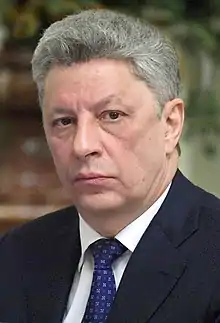

.jpg.webp)
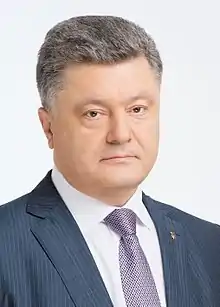

.png.webp)